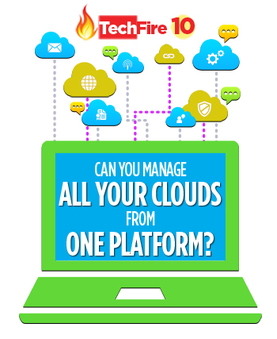As far back as 2012, analyst IDC identified the need for automated provisioning and orchestration of cloud operations, predicting that the combined market for public and private cloud systems management software will reach $2.5 billion (€1.8 billion) by 2015. Other research too was already highlighting the fact that hybrid cloud solutions, mixing elements of private and public cloud with traditional on-premise IT environments, were the preferred route for most enterprise.
Another IDC survey report from 2012 showed that 40% of enterprises were adopting hybrid cloud, while 69% indicated that hybrid was the preferred option for cloud. The survey respondents indicated that the third highest rated cloud requirement was for orchestration of applications between public and private clouds and on-premise IT environments. More than half (56%) said that they were engaging an external service provider to help with cloud strategy.
In 2013, a report by Technology Business Research showed that 70% of the market has or will purchase cloud orchestration services in the near future. However, despite the strong growth in the use of hybrid cloud solutions, and the expressed intentions to procure orchestration services, there are criticisms and differing perceptions of the need for them.
IDC analyst Alessandro Perilli has been particularly vocal via his Twitter account on the subject.
“Unsurprisingly (and unfortunately), selecting a cloud management platform is often a matter of perception,” said Perilli.
Perilli has been critical in several areas, commenting that multi-tenancy support was not what it should be, and that there was often poor vendor differentiation among solutions. He also said that orchestration engines in cloud management platforms are not as sophisticated as they should be.
“The *very* few orgs that calculated the ROI for the cloud orchestration effort *know* how expensive it is. Others underestimate it” Perilli tweeted last year.
However, Deloitte’s fifth Tech Trends Report has identified cloud orchestration as a key enabler technology.
Acknowledging that cloud adoption across the enterprise is a fast growing area, the need for cloud orchestration is growing too. “Tactical adoption of cloud is giving way to the need for a coordinated, orchestrated strategy – and for a new class of cloud offerings built around business outcomes,” said Deloitte.
With the benefits of good cloud platform management and orchestration indisputable but the choices many among vendors and approaches, organisations are left with both confusion as to the need and difficulties in deciding between approaches on acknowledging a need.
To address this topic, TechFire 10, in association with NetApp and its partner Cisco, will discuss a new approach termed “unbound cloud” where an aligned, flexible, hybrid architecture allows IT to leverage its role as broker of services to full strategic advantage.
Some infrastructures are developed and managed on the premises, some are outsourced to a service provider and some are rented from a hyperscaler, such as Amazon or Microsoft. Moving any workload to the public cloud involves careful planning and migration. Achieving portability of workloads across public clouds along with the ability to bring workloads back in-house are also of paramount importance.
The unbound cloud empowers the best choice of IT environment for the business process, without compromising security, policy management, data protection, availability or consistency.
For IT today, this consistency without compromise is critical. The lack of a long-term strategy and architecture leads to the creation of fragmented and chaotic data environments that can be difficult — and costly — to unravel.
TechFire 10 takes place on 30 April, at the Gibson Hotel in Dublin, and on 1 May at the Rochestown Park Hotel in Cork. These are morning sessions, with breakfast from 07:30 for a 08:00 start, are free to attend but registration is required.







Subscribers 0
Fans 0
Followers 0
Followers